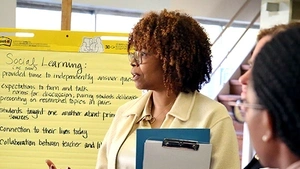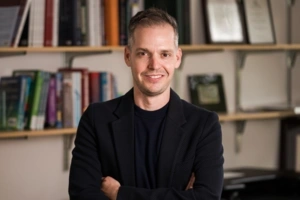Before the first day of the school this year, most teachers, staff, and principals took part in some kind of professional development (PD) exercise. Many districts have PD days scattered through the year.
In today’s working world, education is the rare space that dedicates paid time to helping professionals improve their craft.
If only schools approached career development the same way. While professional development is part of school culture, career development is rarely discussed, especially for K-12 teachers.
That’s a problem for educators and education, says Penn GSE’s Director of Career and Professional Development Amy Benedict.
Schools are crowded places, but schooling can be isolating. Because education is a caring profession, teachers, staff and school administrators often prioritize the good of the school community over their own needs.
The Educator’s Playbook is kicking off an occasional series with Benedict focused on navigating a career in education. In these editions, Benedict will work through some of the thorny questions she most frequently hears from educators.
Should I think about moving into a different role? How do I prepare for my first job interview in a decade? How do I handle a bad principal? Am I burned out?
We’ll start with the basics: Why it’s time to update your career plan, even if you aren’t on the job market.
Join up
There is a good chance you are already on a committee at your school. Or your district. Or possibly your union.
This year, try joining a professional association that is dedicated to the field or your position but isn’t tied to your district. It could be regional or national. Perhaps your alma mater has an interest group for like-minded alums. Or look for an online group, where you can start by "lurking" (which is really just reading) before jumping into conversations. No matter your choice, you’ll hear different perspectives and come away with new ideas.
Plus, Benedict says, associations give you a chance to step outside the internal politics of your school. You’ll feel safer to express both your ambitions and doubts.
Look around
One of the major things Benedict believes is vital to career development is continually growing — and tending to — your personal network. While educators might feel uneasy about something that seems reserved for the corporate world, it's important that you have a circle of people that you can ask for advice, lean on in times of stress, or who might surface new opportunities.
A young teacher might be looking for a mentor, a more experienced teacher might be thinking about pursuing a leadership role, and a veteran teacher might be starting to think about their legacy. A strong personal network can help facilitate all three.
For more experienced teachers in particular, Benedict suggests that it's helpful to start building connections with the younger generation. In part to help guide the next generation of educators, but also because young folks can provide some welcome perspective and help bridge those knowledge gaps. That might be new technology, or just what the kids are into these days. "I know that current students have knowledge about stuff that I don’t know about," Benedict says. "So honor the fact that in certain areas, younger folks do know more than I do."
Boost your expertise
You probably have interests related to education, but outside your specialty. Maybe it’s education policy in your state. Maybe it’s an interest in creating more diverse learning communities. Or the needs of refugee children.
This year, Benedict recommends picking a topic and diving into it. Read books. Watch TED Talks. Listen to podcasts.
Want more advice for the classroom? Subscribe to the Educator's Playbook newsletter
Be open
You might have a five-year plan to become your school’s math lead or to move into administration. Or, you might be focused on improving in your current role for the long-term.
But stay open to the possibilities life might present to you. Educators can pigeonhole themselves, and not realize the range of positions their skills and experience make them qualified for, in and out of schooling.
We know from statistics that many educators switch careers before retiring. Sometimes it's because they want to move in a different direction. Sometimes life circumstances force a move.
“We’ve seen too many educators struggle to adapt if they decide they need a new career,” Benedict says. “Don’t spend a year or two, or ten, trying to think about what else you might really want to do.”
And remember, Benedict says, the wider your network, the more possibilities might exist.

Subscribe to the Educator's Playbook
Get the latest release of the Educator's Playbook delivered straight to your inbox.
Media Inquiries
Penn GSE Communications is here to help reporters connect with the education experts they need.








